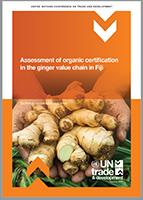
This report provides an analysis of the ginger value chain in Fiji, with a focus on the potential and challenges of organic certification. The report examines the status
of organic certification in the sector, assesses the perceptions of key stakeholders, and identifies opportunities in the organic ginger market. The findings are based on analysis, stakeholder surveys, and expert interviews.
Fiji’s agricultural sector remains a significant share of the national economy, contributing 14.5 per cent to the Gross Domestic Product (GDP) in 2021. Within this sector, ginger has been a key export product since the mid-1980s. Fiji exports ginger to several international markets, including Australia, New Zealand, the United States of America, and the European Union. The global demand for organic products, particularly in the spice market, presents an opportunity for Fiji to enhance its organic ginger exports. Voluntary Sustainability Standards (VSS) can provide access to high-value markets, promoting sustainable agricultural practices and benefiting Fiji’s economy.
The report highlights the growing interest among stakeholders in obtaining organic certification, driven by the potential for higher market access and improved product quality. However, significant challenges remain. These include the high costs of certification, the time and complexity involved in meeting certification requirements, and a lack of technical knowledge among small-scale farmers. There is also a discrepancy between the expectations of non-certified stakeholders and the actual benefits realized by those who have already achieved certification, particularly concerning price premiums for organic products.
Despite these barriers, organic certification presents opportunities. Participatory guarantee system (PGS) certification offers a more accessible pathway for small farmers to enter organic markets, especially in unregulated markets such as Australia and New Zealand.
The Fijian government, through its National Development Plan (NDP), supports the growth of organic farming, recognizing its potential to contribute to sustainable economic development and diversify the country’s export base.
The guide is part of the project titled “Green trade for sustainable development in Pacific small island developing States of the Melanesian Spearhead Group (MSG)”.
The objective of this project is to identify and strengthen synergistic linkages between green trade promotion and the Sustainable Development Strategies (SDS) of MSG member States – Fiji, Papua New Guinea, Solomon Islands and Vanuatu – in a regionally collaborative manner.
The guide was prepared jointly by UNCTAD and the MSG Secretariat, with the support of the Government of Fiji. It is an output for Fiji of Phase 1 of the project. Phase 1 comprises all national activities to identify potential synergistic linkages and to promote green trade. The activities under Phase 1 included:
- Organizing a national workshop in Fiji.
- Collecting and publishing Non-Tariff Measures (NTM) data for fiji.
- Publishing an assessment of Voluntary Sustainability Standards (VSS) for ginger.
- Synergistic Linkages between Green Trade and Sustainable Development in Fiji.
The Phase 1 activities and reports laid the foundation for Phase 2, which entailed the creation of a Subregional Action Plan for Green Trade Promotion at the MSG level.


